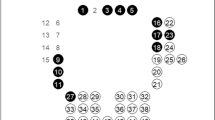Abstract
In this paper, we present the evacuation simulation system that is the combination of a virtual city and a crisis management simulation. The system allows users to become virtual evacuees in an evacuation simulation to learn about crowd behavior. In the experimental use of the system, we found that the synergic effects between a bird’s-eye and a first-person views in learning emergency escaping behaviors. Based on this result, we designed a novel communication system that allows a remote leader to guide escaping crowds in an emergency situation. We deployed our prototype in the Kyoto Station.
Preview
Unable to display preview. Download preview PDF.
Similar content being viewed by others
References
CAD center. Virtual Reality Simulation Program for Architectural Performances (VRSPAP), http://www.cadcenter.co.jp/en/webgallery/webgallery_vr5.html
Fukatsu, S., Kitamura, Y., Masaki, T., Kishino, F.: Intuitive Control of “Bird’s Eye” Overview Images for Navigation in an Enormous Virtual Environment. In: ACM Symposium on Virtual Reality Software and Technology (VRST 1998), pp. 67–76 (1998)
Helbing, D., Farkas, I.J., Vicsek, T.: Simulating Dynamical Features of Escape Panic. Nature 407(6803), 487–490 (2000)
Ishida, T., Ishiguro, H., Nakanishi, H.: Connecting Digital and Physical Cities. In: Tanabe, M., van den Besselaar, P., Ishida, T. (eds.) Digital Cities 2001. LNCS, vol. 2362, pp. 246–256. Springer, Heidelberg (2002)
Ishida, T.: Digital City Kyoto: Social Information Infrastructure for Everyday Life. Communications of the ACM (CACM) 45(7), 76–81 (2002)
Ishida, T.: Activities and technologies in Digital City Kyoto. In: van den Besselaar, P., Koizumi, S. (eds.) Digital Cities 2003. LNCS, vol. 3081, pp. 162–183. Springer, Heidelberg (2005)
Ishida, T.: Q: A Scenario Description Language for Interactive Agents. IEEE Computer 35(11), 54–59 (2002)
Kelly, P.H., Katkere, A., Kuramura, D.Y., Moezzi, S., Chatterjee, S.: An Architecture for Multiple Perspective Interactive Video. In: International Conference on Multimedia (Multimedia 1995), pp. 201–212 (1995)
Kendon, A.: Spatial Organization in Social Encounters: the F-formation System. In: Kendon, A. (ed.) Conducting Interaction: Patterns of Behavior in Focused Encounters, pp. 209–237. Cambridge University Press, Cambridge (1990)
Laird, J.E.: It Knows What You’re Going To Do: Adding Anticipation to a Quakebot. In: International Conference on Autonomous Agents (AAMAS 2001), pp. 385–392 (2001)
Linturi, R., Koivunen, M., Sulkanen, J.: Helsinki Arena 2000 - Augmenting a Real City to a Virtual One. In: Ishida, T., Isbister, K. (eds.) Digital Cities 1999. LNCS, vol. 1765, pp. 83–96. Springer, Heidelberg (2000)
Linturi, R., Simula, T.: Virtual Helsinki. In: van den Besselaar, P., Koizumi, S. (eds.) Digital Cities 2003. LNCS, vol. 3081, pp. 110–137. Springer, Heidelberg (2005)
Murakami, Y., Ishida, T., Kawasoe, T., Hishiyama, R.: Scenario Description for Multi-Agent Simulation. In: International Joint Conference on Autonomous Agents and Multiagent Systems (AAMAS 2003), pp. 369–376 (2003)
Nakanishi, H., Yoshida, C., Nishimura, T., Ishida, T.: FreeWalk: A 3D Virtual Space for Casual Meetings. IEEE Multimedia 6(2), 20–28 (1999)
Okazaki, S., Matsushita, S.: A Study of Simulation Model for Pedestrian Movement with Evacuation and Queuing. In: International Conference on Engineering for Crowd Safety, pp. 271–280 (1993)
Sugiman, T., Misumi, J.: Development of a New Evacuation Method for Emergencies: Control of Collective Behavior by Emergent Small Groups. Journal of Applied Psychology 73(1), 3–10 (1988)
Swartout, W., Hill, R., Gratch, J., Johnson, W.L., Kyriakakis, C., Labore, K., Lindheim, R., Marsella, S., Miraglia, D., Moore, B., Morie, J., Rickel, J., Thiebaux, M., Tuch, L., Whitney, R., Douglas, J.: Toward the Holodeck: Integrating Graphics, Sound, Character and Story. In: International Conference on Autonomous Agents (AAMAS 2001), pp. 409–416 (2001)
Tsutsuguchi, K., Shimada, S., Suenaga, Y., Sonehara, N., Ohtsuka, S.: Human Walking Animation based on Foot Reaction Force in the Three-dimensional Virtual World. Journal of Visualization and Computer Animation 11(1), 3–16 (2000)
Author information
Authors and Affiliations
Editor information
Editors and Affiliations
Rights and permissions
Copyright information
© 2005 Springer-Verlag Berlin Heidelberg
About this paper
Cite this paper
Nakanishi, H., Koizumi, S., Ishida, T. (2005). Virtual Cities for Real-World Crisis Management. In: van den Besselaar, P., Koizumi, S. (eds) Digital Cities III. Information Technologies for Social Capital: Cross-cultural Perspectives. Digital Cities 2003. Lecture Notes in Computer Science, vol 3081. Springer, Berlin, Heidelberg. https://doi.org/10.1007/11407546_10
Download citation
DOI: https://doi.org/10.1007/11407546_10
Publisher Name: Springer, Berlin, Heidelberg
Print ISBN: 978-3-540-25331-0
Online ISBN: 978-3-540-25971-8
eBook Packages: Computer ScienceComputer Science (R0)




